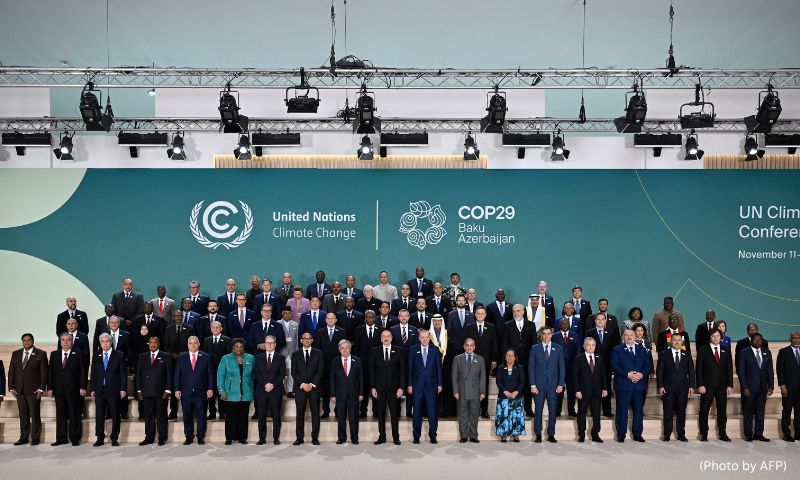BAKU: The host of the UN climate summit in Azerbaijan on Tuesday defended fossil fuels and the right of countries to exploit them as dozens of world leaders arrived for the COP29 conference.
According to AFP, more than 75 leaders are expected but the heads of top polluting nations are skipping the crunch climate talks, where the impact of Donald Trump’s election victory is being digested.
Just a handful of leaders from rich G20 nations — which account for nearly 80 percent of the world’s planet-heating emissions — are expected over two days in Baku.
In the host’s opening address, President Ilham Aliyev said Azerbaijan had been subject to “slander and blackmail” for its use of fossil fuels and that no country should be judged for its natural resources.
“Quote me that I said that this is a gift of the God, and I want to repeat it today here at this audience,” Aliyev told delegates.
“Oil, gas, wind, sun, gold, silver, copper, all… are natural resources and countries should not be blamed for having them and should not be blamed for bringing these resources to the market, because the market needs them.”
“People need them.”
Joe Biden, Xi Jinping, Indian Prime Minister Modi, Emmanuel Macron and Olaf Scholz are among G20 leaders missing the event, where uncertainty over future US climate action overshadowed the opening day. CNN reported that the China, India, the United States and the European Union were responsible for around 83% of emissions in the year of 2022.
AFP reported that UK Prime Minister Keir Starmer, one of the higher profile leaders attending, will unveil an “ambitious” update to the UK’s climate goals later today, and said he wanted his country “to show leadership on the climate challenge.”
And Washington’s top climate envoy John Podesta is seeking to reassure countries in Baku that Trump’s re-election will not end US efforts on global warming, even if the issue will be “on the back burner”.
Tough COP
The top priority at COP29 is landing a hard-fought deal to boost funding for climate action in developing countries.
These nations — from low-lying islands to fractured states at war — are least responsible for climate change but most at risk from rising seas, extreme weather and economic shocks.
Some are pushing for the existing pledge of $100 billion a year to be raised ten-fold at COP29 to cover the future cost of their nations shifting to clean energy and adapting to climate shocks.
READ ALSO: Climate Crisis Worsening Already ‘Hellish’ Refugee Situation: UN
COP29 president Mukhtar Babayev, a former oil executive, told negotiators on Monday that trillions may be needed, but a figure in the hundreds of billions was more “realistic”.
That has angered developing countries and NGOs, who argue rich countries and historical emitters owe a “climate debt.”
Deal a must
Developing countries warn that without adequate finance, they will struggle to offer ambitious updates to their climate goals, which countries are required to submit by early next year.
The small group of developed countries that currently contributes the money wants the donor pool expanded to include other rich nations and top emitters, including China and the Gulf states, something firmly rejected by Beijing.
UN Secretary General Antonio Guterres on Tuesday said developing nations “must not leave Baku empty-handed”.
Around 50,000 people are attending summit in Azerbaijan, a petrostate wedged between Russia and Iran, including the leaders of many African, Asian and Latin American countries beset by climate disasters.
Pakistan’s Prime Minister Shehbaz Sharif is also attending the COP29, in Baku, where he is likely to call for a balanced and ambitious approach to climate change.
PM Shehbaz Sharif will participate in the two-day ‘World Leaders Climate Action Summit’ today, and is set to address on Wednesday.
Pakistan is ranked among the top ten most climate-vulnerable nations, the Global Climate Risk Index 2021 said.
It has also faced increasingly frequent and severe weather events, such as floods, intense monsoon rains, rapid glacial melting, devastating heat waves, and glacial lake outburst floods.
According to the international Air Quality Index Scale, an index value of 300 or higher results is “hazardous” to health and Pakistan has regularly tipped over 1,000 on the scale.
In Multan, another city of several million people some 350 kilometres away, the AQI level passed 2,000 last week — a staggering height never seen before by incredulous residents.-AFP























